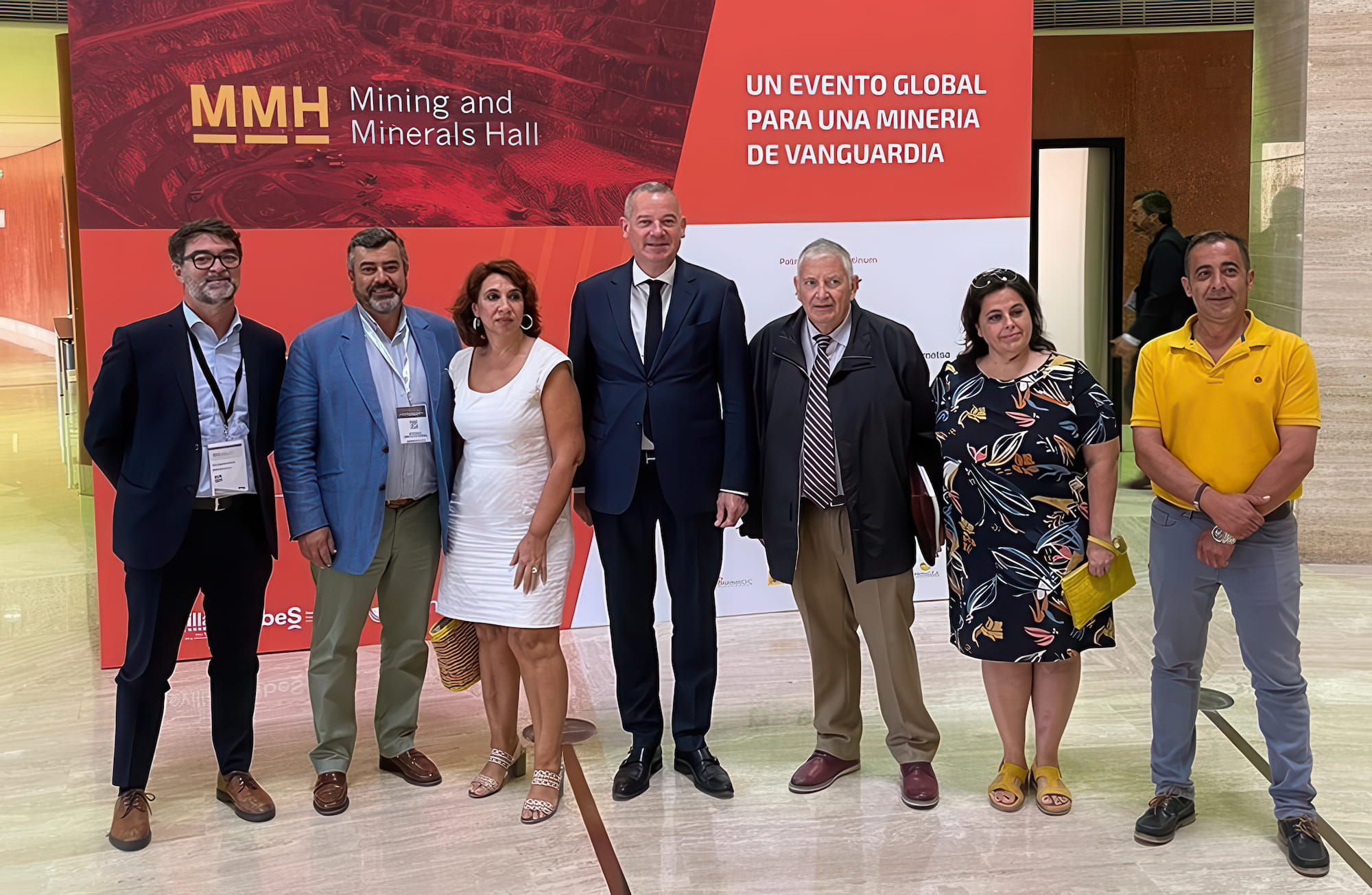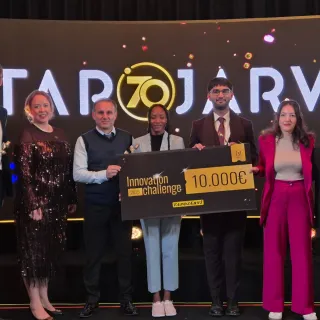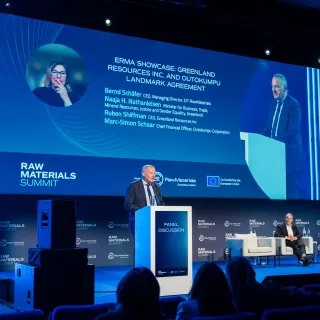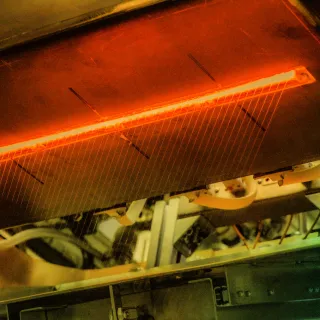El Moto: The Spanish mine set to boost Europe’s tungsten supply by 20 percent
The El Moto tungsten and gold project in the autonomous community of Castilla-La Mancha, Spain, recently reached a major milestone with the completion of its Definitive Feasibility Study (DFS), confirming a resource of 91 million tons of tungsten ore and 1.2 million ounces of gold. The project is set to make a substantial contribution to strengthening Europe’s supply of tungsten.
Gonzalo Garcia Sanchez, CEO, Abenójar Tungsten SL (2nd left) with Veronica Garcia Sanchez, mayor of Abenójar (3rd left) and Bernd Schäfer CEO, Managing Director, EIT RawMaterials (4th left) at the MMH in 2022.
Tungsten, classified by the European Commission as both a critical and strategic raw material, is vital to EU’s green and digital transition as it is an enabler in several industries, including manufacturing, aerospace, energy and transport. Its exceptional strength, density, and resistance to heat make it indispensable to a wide range of applications: from lightbulb filaments and robotic arm components to green technologies like solar photovoltaics and advanced battery systems for electric vehicles.
Despite its importance, Europe remains highly dependent on tungsten imports, with China controlling over 80 percent of the global supply and dictating prices for tungsten and its derivatives. This heavy reliance presents a significant risk to Europe's supply chain, particularly in light of China's recently announced export controls on tungsten. The need for Europe to secure a reliable and sustainable domestic supply of this vital resource is increasingly urgent.
The El Moto project is well-placed to meet this need. Once operational, it is projected to supply 20 percent of Europe’s tungsten demand - far exceeding the Critical Raw Materials Act target for the EU to domestically produce at least 10 percent of its critical raw materials needs.
A unique deposit
First discovered during gold exploration by Spain’s state-owned company MAYASA, the tungsten-gold deposit found at El Moto represents a unique resource in Europe and is the only site of its kind ready for production. Over the past 12 years, Abenójar Tungsten SL has invested nearly €15 million of its own funds in developing the project.
This significant investment of resources has uncovered a highly valuable deposit, with a tungsten trioxide (WO3) grade of over 0.4%, making it the richest tungsten deposit in Europe. The porphyry structure also offers practical benefits, enabling mining with minimal waste, which will improve both efficiency and sustainability in the extraction process.
The significant gold content of the deposit is also set to increase the project’s revenue potential by more than 15 percent.
A responsible step forward for Europe’s resource needs
The value of the El Moto project stretches beyond meeting industrial needs or generating profits - it also represents a significant opportunity for the local region while addressing Europe’s critical resource needs.

Successful community involvement like the Women in Mining Conference held in cooperation with the El Moto Tungsten team in 2023.
Located in Abenójar, to the southwest of Ciudad Real, within the Autonomous Community of Castilla-La Mancha, the project aims to start construction in 2025, with initial production expected by 2027. This comes at a pivotal moment for the region, which is grappling with challenges such as rural depopulation and economic stagnation.
“Castilla-La Mancha, as well as our town and the whole rural environment in which we are located, is fighting against depopulation and the demographic challenge,” said Veronica Garcia Sanchez, mayor of Abenójar. “The location and exploitation of this mining project will mean an important industrial, economic, and employment development in the whole region.”
Fully owned by European private investors, the mine will create over 500 high-skilled jobs and has been supported by both national and local stakeholders, including Spain’s two leading political parties, and actively engages in rural development initiatives and partnerships with community organisations.
Beyond employment, the project will benefit other sectors such as transport, construction, commerce, and local services. The development aligns with the region’s main industries and can coexist harmoniously with traditional activities in the region such as livestock farming, agriculture, forestry, and hunting.
Social and environmental responsibility have been prioritised from the start, Garcia Sanchez explained: “From the outset, the local administration, together with the invaluable collaboration of the project promoters, has informed the population of the benefits of the project, always prioritising the importance of the environmental impact, social acceptance, and compliance with all environmental regulations.”
As Garcia Sanchez concluded, “An informed population that sees no environmental risks, that the project is being developed with the highest standards of quality and safety, and that the economic benefits are distributed equitably, favours social acceptance across the whole region and province.”
Support from EIT RawMaterials
EIT RawMaterials and the European Raw Materials Alliance (ERMA) have played an important role in supporting the development of the El Moto mine and the project is now seeking recognition as a strategic initiative under the Critical Raw Materials Act (CRMA), working closely with ERMA and EIT RawMaterials.
Gonzalo García San Miguel, CEO of Abenójar Tungsten SL, summed up the journey so far:
“After 14 years of productive yet challenging preparation, we are thrilled to embark on the final phase of this project: delivering high-grade tungsten from Europe, for Europe. We extend our heartfelt gratitude to EIT RawMaterials for their unwavering support in exploring financing opportunities and accompanying us on this crucial step toward opening a mine that is vital for Europe’s future.”
Next steps for the project
The El Moto project is now entering a critical phase, requiring €140 million in funding to kick off construction of its underground mining operations in 2025. Production is expected to begin by 2027, but progress depends heavily on strong support from national and European institutions.
Mayor Veronica García Sánchez of Abenójar emphasised the importance of institutional backing to drive the project forward and called for subsidies and tax incentives to encourage investment and job creation in Castilla-La Mancha, alongside public funding for essential infrastructure such as roads, transport systems, and electricity grids. “The approval of economic and fiscal incentives for strategic projects would significantly boost regional development and ensure the benefits reach local communities,” she said.
The mayor also stressed the need to streamline bureaucratic processes, urging authorities to simplify permits and reduce administrative delays to fast-track progress. “I encourage public bodies to act swiftly to secure funding and shorten deadlines so the project can materialise as soon as possible,” she added.
Recognising its broader significance, García Sánchez highlighted the importance of classifying El Moto as a strategic European initiative under the Critical Raw Materials Act, as this designation would help unlock European funding for sustainable mining and position the project as a cornerstone of Europe’s energy transition and resource independence.

El Moto Project team at the drilling site in Abenójar, Spain



